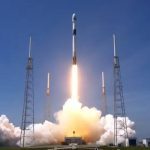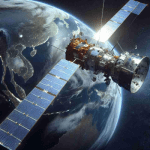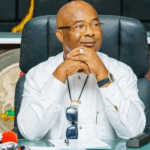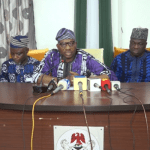Sergei Ryabkov, Russia’s Deputy Foreign Minister, denied on Wednesday that the country had launched an anti-satellite missile.
According to TASS and Interfax news agencies, Ryabkov stated that Moscow opposed the deployment of weapons in orbit.
Ryabkov stated that Russia was still adhering to the quantitative limits on nuclear weapons imposed by the New START pact between Moscow and Washington.
A day ago, the Pentagon revealed that Russia had launched a satellite capable of destroying other satellites.
The United States pointed to the launch of a Soyuz rocket from Russia’s Plesetsk launch pad earlier this month. Russia’s defense ministry confirmed that the May 17 launch included a spacecraft but did not elaborate on its purpose.
US Space Command said the launch was a likely a counterspace weapon capable of attacking other satellites in low Earth orbit.
President Vladimir Putin and his then defense minister, Sergei Shoigu, denied US assertions in February that Russia was developing a space-based anti-satellite nuclear weapon designed to disrupt everything from military communications to phone-based ride services.
US Space Command said the May launch, which it dates as May 16, included COSMOS 2576, a type of Russian military “inspector” spacecraft that US officials have long said exhibits reckless space behavior.
According to a US individual familiar with the intelligence, US intelligence services had been anticipating the launch of COSMOS 2576 and had notified allies of their evaluation of the satellite prior to its deployment in space. Aside from that, there were also civilian satellites launched into various orbits.
Although he noted that “this is also not news,” Ryabkov stated that Russia’s space program was moving forward as intended, including projects meant to bolster defense capabilities.
He claimed that the United States erred in rejecting Russian suggestions for enhancing space activity security, including one for creating a treaty to stop an arms race in space.
Sergei Ryabkov, Russia’s Deputy Foreign Minister, denied on Wednesday that the country had launched an anti-satellite missile.
According to TASS and Interfax news agencies, Ryabkov stated that Moscow opposed the deployment of weapons in orbit.
Ryabkov stated that Russia was still adhering to the quantitative limits on nuclear weapons imposed by the New START pact between Moscow and Washington.
A day ago, the Pentagon revealed that Russia had launched a satellite capable of destroying other satellites.
The United States pointed to the launch of a Soyuz rocket from Russia’s Plesetsk launch pad earlier this month. Russia’s defense ministry confirmed that the May 17 launch included a spacecraft but did not elaborate on its purpose.
US Space Command said the launch was a likely a counterspace weapon capable of attacking other satellites in low Earth orbit.
President Vladimir Putin and his then defense minister, Sergei Shoigu, denied US assertions in February that Russia was developing a space-based anti-satellite nuclear weapon designed to disrupt everything from military communications to phone-based ride services.
US Space Command said the May launch, which it dates as May 16, included COSMOS 2576, a type of Russian military “inspector” spacecraft that US officials have long said exhibits reckless space behavior.
According to a US individual familiar with the intelligence, US intelligence services had been anticipating the launch of COSMOS 2576 and had notified allies of their evaluation of the satellite prior to its deployment in space. Aside from that, there were also civilian satellites launched into various orbits.
Although he noted that “this is also not news,” Ryabkov stated that Russia’s space program was moving forward as intended, including projects meant to bolster defense capabilities.
He claimed that the United States erred in rejecting Russian suggestions for enhancing space activity security, including one for creating a treaty to stop an arms race in space.
Sergei Ryabkov, Russia’s Deputy Foreign Minister, denied on Wednesday that the country had launched an anti-satellite missile.
According to TASS and Interfax news agencies, Ryabkov stated that Moscow opposed the deployment of weapons in orbit.
Ryabkov stated that Russia was still adhering to the quantitative limits on nuclear weapons imposed by the New START pact between Moscow and Washington.
A day ago, the Pentagon revealed that Russia had launched a satellite capable of destroying other satellites.
The United States pointed to the launch of a Soyuz rocket from Russia’s Plesetsk launch pad earlier this month. Russia’s defense ministry confirmed that the May 17 launch included a spacecraft but did not elaborate on its purpose.
US Space Command said the launch was a likely a counterspace weapon capable of attacking other satellites in low Earth orbit.
President Vladimir Putin and his then defense minister, Sergei Shoigu, denied US assertions in February that Russia was developing a space-based anti-satellite nuclear weapon designed to disrupt everything from military communications to phone-based ride services.
US Space Command said the May launch, which it dates as May 16, included COSMOS 2576, a type of Russian military “inspector” spacecraft that US officials have long said exhibits reckless space behavior.
According to a US individual familiar with the intelligence, US intelligence services had been anticipating the launch of COSMOS 2576 and had notified allies of their evaluation of the satellite prior to its deployment in space. Aside from that, there were also civilian satellites launched into various orbits.
Although he noted that “this is also not news,” Ryabkov stated that Russia’s space program was moving forward as intended, including projects meant to bolster defense capabilities.
He claimed that the United States erred in rejecting Russian suggestions for enhancing space activity security, including one for creating a treaty to stop an arms race in space.
Sergei Ryabkov, Russia’s Deputy Foreign Minister, denied on Wednesday that the country had launched an anti-satellite missile.
According to TASS and Interfax news agencies, Ryabkov stated that Moscow opposed the deployment of weapons in orbit.
Ryabkov stated that Russia was still adhering to the quantitative limits on nuclear weapons imposed by the New START pact between Moscow and Washington.
A day ago, the Pentagon revealed that Russia had launched a satellite capable of destroying other satellites.
The United States pointed to the launch of a Soyuz rocket from Russia’s Plesetsk launch pad earlier this month. Russia’s defense ministry confirmed that the May 17 launch included a spacecraft but did not elaborate on its purpose.
US Space Command said the launch was a likely a counterspace weapon capable of attacking other satellites in low Earth orbit.
President Vladimir Putin and his then defense minister, Sergei Shoigu, denied US assertions in February that Russia was developing a space-based anti-satellite nuclear weapon designed to disrupt everything from military communications to phone-based ride services.
US Space Command said the May launch, which it dates as May 16, included COSMOS 2576, a type of Russian military “inspector” spacecraft that US officials have long said exhibits reckless space behavior.
According to a US individual familiar with the intelligence, US intelligence services had been anticipating the launch of COSMOS 2576 and had notified allies of their evaluation of the satellite prior to its deployment in space. Aside from that, there were also civilian satellites launched into various orbits.
Although he noted that “this is also not news,” Ryabkov stated that Russia’s space program was moving forward as intended, including projects meant to bolster defense capabilities.
He claimed that the United States erred in rejecting Russian suggestions for enhancing space activity security, including one for creating a treaty to stop an arms race in space.
Sergei Ryabkov, Russia’s Deputy Foreign Minister, denied on Wednesday that the country had launched an anti-satellite missile.
According to TASS and Interfax news agencies, Ryabkov stated that Moscow opposed the deployment of weapons in orbit.
Ryabkov stated that Russia was still adhering to the quantitative limits on nuclear weapons imposed by the New START pact between Moscow and Washington.
A day ago, the Pentagon revealed that Russia had launched a satellite capable of destroying other satellites.
The United States pointed to the launch of a Soyuz rocket from Russia’s Plesetsk launch pad earlier this month. Russia’s defense ministry confirmed that the May 17 launch included a spacecraft but did not elaborate on its purpose.
US Space Command said the launch was a likely a counterspace weapon capable of attacking other satellites in low Earth orbit.
President Vladimir Putin and his then defense minister, Sergei Shoigu, denied US assertions in February that Russia was developing a space-based anti-satellite nuclear weapon designed to disrupt everything from military communications to phone-based ride services.
US Space Command said the May launch, which it dates as May 16, included COSMOS 2576, a type of Russian military “inspector” spacecraft that US officials have long said exhibits reckless space behavior.
According to a US individual familiar with the intelligence, US intelligence services had been anticipating the launch of COSMOS 2576 and had notified allies of their evaluation of the satellite prior to its deployment in space. Aside from that, there were also civilian satellites launched into various orbits.
Although he noted that “this is also not news,” Ryabkov stated that Russia’s space program was moving forward as intended, including projects meant to bolster defense capabilities.
He claimed that the United States erred in rejecting Russian suggestions for enhancing space activity security, including one for creating a treaty to stop an arms race in space.
Sergei Ryabkov, Russia’s Deputy Foreign Minister, denied on Wednesday that the country had launched an anti-satellite missile.
According to TASS and Interfax news agencies, Ryabkov stated that Moscow opposed the deployment of weapons in orbit.
Ryabkov stated that Russia was still adhering to the quantitative limits on nuclear weapons imposed by the New START pact between Moscow and Washington.
A day ago, the Pentagon revealed that Russia had launched a satellite capable of destroying other satellites.
The United States pointed to the launch of a Soyuz rocket from Russia’s Plesetsk launch pad earlier this month. Russia’s defense ministry confirmed that the May 17 launch included a spacecraft but did not elaborate on its purpose.
US Space Command said the launch was a likely a counterspace weapon capable of attacking other satellites in low Earth orbit.
President Vladimir Putin and his then defense minister, Sergei Shoigu, denied US assertions in February that Russia was developing a space-based anti-satellite nuclear weapon designed to disrupt everything from military communications to phone-based ride services.
US Space Command said the May launch, which it dates as May 16, included COSMOS 2576, a type of Russian military “inspector” spacecraft that US officials have long said exhibits reckless space behavior.
According to a US individual familiar with the intelligence, US intelligence services had been anticipating the launch of COSMOS 2576 and had notified allies of their evaluation of the satellite prior to its deployment in space. Aside from that, there were also civilian satellites launched into various orbits.
Although he noted that “this is also not news,” Ryabkov stated that Russia’s space program was moving forward as intended, including projects meant to bolster defense capabilities.
He claimed that the United States erred in rejecting Russian suggestions for enhancing space activity security, including one for creating a treaty to stop an arms race in space.
Sergei Ryabkov, Russia’s Deputy Foreign Minister, denied on Wednesday that the country had launched an anti-satellite missile.
According to TASS and Interfax news agencies, Ryabkov stated that Moscow opposed the deployment of weapons in orbit.
Ryabkov stated that Russia was still adhering to the quantitative limits on nuclear weapons imposed by the New START pact between Moscow and Washington.
A day ago, the Pentagon revealed that Russia had launched a satellite capable of destroying other satellites.
The United States pointed to the launch of a Soyuz rocket from Russia’s Plesetsk launch pad earlier this month. Russia’s defense ministry confirmed that the May 17 launch included a spacecraft but did not elaborate on its purpose.
US Space Command said the launch was a likely a counterspace weapon capable of attacking other satellites in low Earth orbit.
President Vladimir Putin and his then defense minister, Sergei Shoigu, denied US assertions in February that Russia was developing a space-based anti-satellite nuclear weapon designed to disrupt everything from military communications to phone-based ride services.
US Space Command said the May launch, which it dates as May 16, included COSMOS 2576, a type of Russian military “inspector” spacecraft that US officials have long said exhibits reckless space behavior.
According to a US individual familiar with the intelligence, US intelligence services had been anticipating the launch of COSMOS 2576 and had notified allies of their evaluation of the satellite prior to its deployment in space. Aside from that, there were also civilian satellites launched into various orbits.
Although he noted that “this is also not news,” Ryabkov stated that Russia’s space program was moving forward as intended, including projects meant to bolster defense capabilities.
He claimed that the United States erred in rejecting Russian suggestions for enhancing space activity security, including one for creating a treaty to stop an arms race in space.
Sergei Ryabkov, Russia’s Deputy Foreign Minister, denied on Wednesday that the country had launched an anti-satellite missile.
According to TASS and Interfax news agencies, Ryabkov stated that Moscow opposed the deployment of weapons in orbit.
Ryabkov stated that Russia was still adhering to the quantitative limits on nuclear weapons imposed by the New START pact between Moscow and Washington.
A day ago, the Pentagon revealed that Russia had launched a satellite capable of destroying other satellites.
The United States pointed to the launch of a Soyuz rocket from Russia’s Plesetsk launch pad earlier this month. Russia’s defense ministry confirmed that the May 17 launch included a spacecraft but did not elaborate on its purpose.
US Space Command said the launch was a likely a counterspace weapon capable of attacking other satellites in low Earth orbit.
President Vladimir Putin and his then defense minister, Sergei Shoigu, denied US assertions in February that Russia was developing a space-based anti-satellite nuclear weapon designed to disrupt everything from military communications to phone-based ride services.
US Space Command said the May launch, which it dates as May 16, included COSMOS 2576, a type of Russian military “inspector” spacecraft that US officials have long said exhibits reckless space behavior.
According to a US individual familiar with the intelligence, US intelligence services had been anticipating the launch of COSMOS 2576 and had notified allies of their evaluation of the satellite prior to its deployment in space. Aside from that, there were also civilian satellites launched into various orbits.
Although he noted that “this is also not news,” Ryabkov stated that Russia’s space program was moving forward as intended, including projects meant to bolster defense capabilities.
He claimed that the United States erred in rejecting Russian suggestions for enhancing space activity security, including one for creating a treaty to stop an arms race in space.














